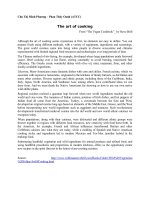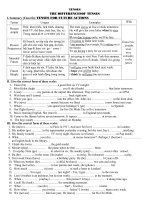The damnation of theron ware
Bạn đang xem bản rút gọn của tài liệu. Xem và tải ngay bản đầy đủ của tài liệu tại đây (1.27 MB, 284 trang )
ProjectGutenberg'sTheDamnationofTheronWare,byHaroldFrederic
ThiseBookisfortheuseofanyoneanywhereatnocostandwith
almostnorestrictionswhatsoever.Youmaycopyit,giveitawayor
re-useitunderthetermsoftheProjectGutenbergLicenseincluded
withthiseBookoronlineatwww.gutenberg.org
Title:TheDamnationofTheronWare
Author:HaroldFrederic
ReleaseDate:March8,2006[EBook#133]
LastUpdated:March14,2018
Language:English
***STARTOFTHISPROJECTGUTENBERGEBOOKTHEDAMNATIONOFTHERONWARE***
ProducedbyMeredithRicker,JohnHammandDavidWidger
THEDAMNATIONOFTHERON
WARE
byHaroldFrederic
CONTENTS
PARTI
CHAPTERI
CHAPTERII
CHAPTERIII
CHAPTERIV
CHAPTERV
CHAPTERVI
CHAPTERVII
CHAPTERVIII
CHAPTERIX
CHAPTERX
PARTII
CHAPTERXI
CHAPTERXII
CHAPTERXIII
CHAPTERXIV
CHAPTERXV
CHAPTERXVI
CHAPTERXVII
PARTIII
CHAPTERXVIII
CHAPTERXIX
CHAPTERXX
CHAPTERXXI
CHAPTERXXII
CHAPTERXXIII
CHAPTERXXIV
PARTIV
CHAPTERXXV
CHAPTERXXVI
CHAPTERXXVII
CHAPTERXXVIII
CHAPTERXXIX
CHAPTERXXX
CHAPTERXXXI
CHAPTERXXXII
PARTI
CHAPTERI
Nosuchthronghadeverbeforebeenseeninthebuildingduringallitseight
yearsofexistence.Peoplewerewedgedtogethermostuncomfortablyuponthe
seats;theystoodpackedintheaislesandoverflowedthegalleries;attheback,in
theshadowsunderneaththesegalleries,theyformedbroad,densemassesabout
thedoors,throughwhichitwouldbehopelesstoattemptapassage.
The light, given out from numerous tin-lined circles of flaring gas-jets
arrangedontheceiling,fellfulluponathousandupliftedfaces—someframedin
bonnetsorjuvenilecurls,othersbeardedorcrownedwithshiningbaldness—but
allalikeunderthespellofadominantemotionwhichheldfeaturesinabstracted
suspenseandfocussedeveryeyeuponacommonobjectivepoint.
The excitement of expectancy reigned upon each row of countenances, was
visibleineveryattitude—nay,seemedapartoftheclose,overheatedatmosphere
itself.
Anobserver,lookingoverthesecompactlinesoffacesandnotingtheuniform
concentration of eagerness they exhibited, might have guessed that they were
watchingforeitherthejury'sverdictinsomepeculiarlyabsorbingcriminaltrial,
or the announcement of the lucky numbers in a great lottery. These two
expressionsseemedtoalternate,andeventominglevaguely,upontheupturned
lineamentsofthewaitingthrong—thehopeofsomeunnamedstrokeoffortune
andthedreadofsomeadversedecree.
Butaglanceforwardattheobjectofthisuniversalgazewouldhavesufficed
toshatterbothhypotheses.Herewasneitheracourtofjusticenoratombola.It
was instead the closing session of the annual Nedahma Conference of the
Methodist Episcopal Church, and the Bishop was about to read out the list of
ministerialappointmentsforthecomingyear.Thislistwasevidentlywrittenina
hand strange to him, and the slow, near-sighted old gentleman, having at last
sufficientlyrubbedtheglassesofhisspectacles,andthenadjustedthemoverhis
nosewithannoyingdeliberation,wasnowsilentlyrehearsinghistasktohimself
—thewhiletheclergymenroundaboutgroundtheirteethandrestlesslyshuffled
theirfeetinimpatience.
Uponacloserinspectionoftheassemblage,therewereagreatmanyofthese
clergymen.Adozenormoredignified,andforthemostpartelderly,brethrensat
grouped about the Bishop in the pulpit. As many others, not quite so staid in
mien, and indeed with here and there almost a suggestion of frivolity in their
postures,wereseatedonthestepsleadingdownfromthisplatform.Ascoreof
their fellows sat facing the audience, on chairs tightly wedged into the space
railed off round the pulpit; and then came five or six rows of pews, stretching
acrossthewholebreadthofthechurch,andalmostsolidlyfilledwithpreachers
oftheWord.
Therewereveryoldmenamongthese—bentanddecrepitveteranswhohad
knownLorenzoDow,andhadbeenordainedbyelderswhorememberedFrancis
AsburyandevenWhitefield.Theysatnowinfrontplaces,leaningforwardwith
trembling and misshapen hands behind their hairy ears, waiting to hear their
namesreadoutonthesuperannuatedlist,itmightbeforthelasttime.
ThesightofthesevenerableFathersinIsraelwasgoodtotheeyes,conjuring
up,asitdid,picturesofatimewhenaplainandhomelypeoplehadbeenserved
by a fervent and devoted clergy—by preachers who lacked in learning and
polish, no doubt, but who gave their lives without dream of earthly reward to
povertyandtothedangerandwearingtoilofitinerantmissionsthroughtherude
frontiersettlements.Thesepictureshadfortheirprimitiveaccessorieslog-huts,
roughhouseholdimplements,coarseclothes,andpatchedoldsaddleswhichtold
of weary years of journeying; but to even the least sympathetic vision there
shoneuponthemtheglorifiedlightoftheCrossandCrown.Reverendsurvivors
oftheheroictimes,theirverypresencethere—sittingmeeklyatthealtar-railto
hear again the published record of their uselessness and of their dependence
uponchurchcharity—wasinthenatureofabenediction.
The large majority of those surrounding these patriarchs were middle-aged
men, generally of a robust type, with burly shoulders, and bushing beards
framing shaven upper lips, and who looked for the most part like honest and
prosperous farmers attired in their Sunday clothes. As exceptions to this rule,
therewerescatteredstrayspecimensofamoreurbanclass,worthieswithneatly
trimmed whiskers, white neckcloths, and even indications of hair-oil—all
eloquentofcitifiedcharges;andnowandagaintheeyesingledoutastrikingand
scholarly face, at once strong and simple, and instinctively referred it to the
facultyofoneoftheseveraltheologicalseminariesbelongingtotheConference.
The effect of these faces as a whole was toward goodness, candor, and
imperturbable self-complacency rather than learning or mental astuteness; and
curiouslyenoughitworeitspleasantestaspectonthecountenancesoftheolder
men. The impress of zeal and moral worth seemed to diminish by regular
gradationsasonepassedtoyoungerfaces;andamongtheverybeginners,who
had been ordained only within the past day or two, this decline was peculiarly
marked.Itwasalmostarelieftonotetherelativesmallnessoftheirnumber,so
plainlywasittobeseenthattheywerenotthementheirforbearshadbeen.
And if those aged, worn-out preachers facing the pulpit had gazed instead
backward over the congregation, it may be that here too their old eyes would
havedetectedadifference—whatatleasttheywouldhavedeemedadecline.
But nothing was further from the minds of the members of the First M. E.
ChurchofTecumsehthanthesuggestionthattheywerenotanimprovementon
thosewhohadgonebeforethem.Theywereundoubtedlythesmartestandmost
important congregation within the limits of the Nedahma Conference, and this
newchurchedificeoftheirsrepresentedalikeascaleofoutlayandastandardof
progressive taste in devotional architecture unique in the Methodism of that
wholesectionoftheState.Theyhadarighttobeproudofthemselves,too.They
belonged to the substantial order of the community, with perhaps not so many
very rich men as the Presbyterians had, but on the other hand with far fewer
extremely poor folk than the Baptists were encumbered with. The pews in the
firstfourrowsoftheirchurchrentedforonehundreddollarsapiece—quiteupto
thePresbyterianhighwatermark—andtheynowhadalmostabolishedfreepews
altogether.TheoystersuppersgivenbytheirLadies'AidSocietyinthebasement
of the church during the winter had established rank among the fashionable
eventsinTecumseh'ssocialcalendar.
Acomprehensiveandsatisfiedperceptionoftheseadvantageswasuppermost
in the minds of this local audience, as they waited for the Bishop to begin his
reading.TheyhadentertainedthisBishopandhisPresidingElders,andtherank
and file of common preachers, in a style which could not have been remotely
approachedbyanyothercongregationintheConference.Whereelse,onewould
liketoknow,couldtheBishophavebeendomiciledinaMethodisthousewhere
hemighthaveasitting-roomalltohimself,withhisbedroomleadingoutofit?
Every clergyman present had been provided for in a private residence—even
downtotheLicensedExhorters,whowerenotreallyministersatallwhenyou
cametothinkofit,andwhomightwellthanktheirstarsthattheConferencehad
assembled among such open-handed people. There existed a dim feeling that
these Licensed Exhorters—an uncouth crew, with country store-keepers and
lumbermenandevenahorse-doctoramongtheirnumber—hadtakenrathertoo
much for granted, and were not exhibiting quite the proper degree of gratitude
overtheirreception.
But a more important issue hung now imminent in the balance—was
Tecumsehtobefairlyandhonorablyrewardedforherhospitalitybybeinggiven
thepastorofherchoice?
All were agreed—at least among those who paid pew-rents—upon the great
importance of a change in the pulpit of the First M. E. Church. A change in
persons must of course take place, for their present pastor had exhausted the
three-year maximum of the itinerant system, but there was needed much more
thanthat.Forahandsomeandexpensivechurchbuildinglikethis,andwithsuch
amodernandgo-aheadcongregation,itwassimplyavitalnecessitytosecurean
attractive and fashionable preacher. They had held their own against the
Presbyteriansthesepastfewyearsonlybythemoststrenuousefforts,andunder
the depressing disadvantage of a minister who preached dreary out-of-date
sermons,andwholackedeventhemostrudimentarysenseofsocialdistinctions.
ThePresbyterianshadcapturedthenewcashieroftheAdamsCountyBank,who
had always gone to the Methodist Church in the town he came from, but now
was lost solely because of this tiresome old fossil of theirs; and there were
numerousotherinstancesofthesamesort,scarcelylessgrievous.Thatthisstate
ofthingsmustbealteredwasclear.
TheunusuallylargelocalattendanceuponthesessionsoftheConferencehad
given some of the more guileless of visiting brethren a high notion of
Tecumseh'spiety;andperhapseventhemostsophisticatedstrangerneverquite
realizedhowstrictlyitwastobeexplainedbytheanxietytopickoutasuitable
champion for the fierce Presbyterian competition. Big gatherings assembled
evening after evening to hear the sermons of those selected to preach, and the
church had been almost impossibly crowded at each of the three Sunday
services.Opinionshadnaturallydifferedagooddealduringtheearlierstagesof
this scrutiny, but after last night's sermon there could be but one feeling. The
manforTecumsehwastheReverendTheronWare.
The choice was an admirable one, from points of view much more exalted
thanthoseofthelocalcongregation.
YoucouldseeMr.Waresittingthereattheendoftherowinsidethealtar-rail
—the tall, slender young man with the broad white brow, thoughtful eyes, and
featuresmouldedintothatregularityofstrengthwhichusedtocharacterizethe
American Senatorial type in those far-away days of clean-shaven faces and
moderate incomes before the War. The bright-faced, comely, and vivacious
youngwomaninthesecondsidepewwashiswife—andTecumsehnotedwith
approbation that she knew how to dress. There were really no two better or
worthier people in the building than this young couple, who sat waiting along
with the rest to hear their fate. But unhappily they had come to know of the
effort being made to bring them to Tecumseh; and their simple pride in the
triumph of the husband's fine sermon had become swallowed up in a terribly
anxiousconflictofhopeandfear.Neitherofthemcouldmaintainasatisfactory
show of composure as the decisive moment approached. The vision of
translation from poverty and obscurity to such a splendid post as this—truly it
wastoodazzlingfortranquilnerves.
ThetediousBishophadatlastbeguntocallhisrollofnames,andthegood
peopleofTecumsehmentallytickedthemoff,onebyone,asthelistexpanded.
TheyfeltthatitwaslikethisBishop—anunimportantandcommonplacefigure
inMethodism,nottobementionedinthesamebreathwithSimpsonandJanes
andKingsley—thatheshouldbeginwiththebackwoodscounties,andthrustall
theseremoteandpitifullyrusticstationsaheadoftheirownmetropolitancharge.
To these they listened but listlessly—indifferent alike to the joy and to the
dismaywhichhewasscatteringamongthedivinesbeforehim.
The announcements were being doled out with stumbling hesitation. After
eachonealittlehalf-rustlingmovementthroughthecrowdedrowsofclergymen
passedmutejudgmentuponthecruelblowthisbrotherhadreceived,thereward
justly given to this other, the favoritism by which a third had profited. The
Presiding Elders, whose work all this was, stared with gloomy and impersonal
abstraction down upon the rows of blackcoated humanity spread before them.
Theministersreturnedthisfixedandperfunctorygazewithpale,setfaces,only
feebly masking the emotions which each new name stirred somewhere among
them. The Bishop droned on laboriously, mispronouncing words and repeating
himselfasifhewerereadingacatalogueofunfamiliarseeds.
“FirstchurchofTecumseh—BrotherAbramG.Tisdale!”
There was no doubt about it! These were actually the words that had been
uttered.After all thisoutlay,allthislavishhospitality,allthissacrificeoftime
andpatienceinsittingthroughthosesermons,todrawfromthegrab-bagnothing
betterthan—aTisdale!
A hum of outraged astonishment—half groan, half wrathful snort bounded
alongfrompewtopewthroughoutthebodyofthechurch.Anechoofitreached
theBishop,andsoconfusedhimthathehaltinglyrepeatedtheobnoxiousline.
EverylocaleyeturnedasbyintuitiontowherethecalamitousTisdalesat,and
fastenedmalignantlyuponhim.
Could anything be worse? This Brother Tisdale was past fifty—a spindling,
rickety, gaunt old man, with a long horse-like head and vacantly solemn face,
who kept one or the other of his hands continually fumbling his bony jaw. He
had been withdrawn from routine service for a number of years, doing a little
insurance canvassing on his own account, and also travelling for the Book
Concern.Nowthathewishedtoreturntoparochialwork,therichestprizeinthe
wholelist,Tecumseh,wasgiventohim—tohimwhohadneverbeenaskedto
preach at a Conference, and whose archaic nasal singing of “Greenland's Icy
Mountains”hadmadeeventheLicensedExhortersgrin!Itwastoointolerably
dreadfultothinkof!
AnembitteredwhispertotheeffectthatTisdalewastheBishop'scousinran
roundfrompewtopew.Thisdidnothappentobetrue,butindignantTecumseh
gaveitentirecredit.Thethrongsaboutthedoorsdwindledasbymagic,andthe
aisles cleared. Local interest was dead; and even some of the pewholders rose
andmadetheirwayout.Oneofthesemurmuredaudiblytohisneighborsashe
departedthatHISpewcouldbehadnowforsixtydollars.
Soithappenedthatwhen,alittlelateron,theappointmentofTheronWareto
Octavius was read out, none of the people of Tecumseh either noted or cared.
Theyhadbeendeeplyinterestedinhimsolongasitseemedlikelythathewasto
come to them—before their clearly expressed desire for him had been so
monstrously ignored. But now what became of him was no earthly concern of
theirs.
After the Doxology had been sung and the Conference formally declared
ended,theWareswouldfainhaveescapedfromthefloodofhandshakingsand
boisterous farewells which spread over the front part of the church. But the
clergymen were unusually insistent upon demonstrations of cordiality among
themselves—the more, perhaps, because it was evident that the friendliness of
their local hosts had suddenly evaporated—and, of all men in the world, the
presentincumbentoftheOctaviuspulpitnowboredownuponthemwithnoisy
effusiveness,anddefiedevasion.
“BrotherWare—wehaveneverbeeninterduced—butletmeclaspyourhand!
And—SisterWare,Ipresume—yourstoo!”
Hewasaportlyman,whoheldhisheadbacksothathisfaceseemedalljowl
and mouth and sandy chin-whisker. He smiled broadly upon them with halfclosedeyes,andshookhandsagain.
“I said to 'em,” he went on with loud pretence of heartiness, “the minute I
heerdyournamecalledoutforourdearOctavius,'Imustgooveran'interduce
myself.'Itwillbeaheavycrosstopartwiththosedearpeople,BrotherWare,but
ifanythingcouldweanmetothenotion,sotospeak,itwouldbetheknowledge
that you are to take up my labors in their midst. Perhaps—ah—perhaps they
AREjestatriflecloseinmoneymatters,buttheycomeoutstrongonrevivals.
They'll need a good deal o' stirrin' up about parsonage expenses, but, oh! such
seasonsofgraceaswe'veexperiencedtheretogether!”Heshookhishead,and
closedhiseyesaltogether,asiftransportedbyhismemories.
BrotherWaresmiledfaintlyindecorousresponse,andbowedinsilence;but
his wife resented the unctuous beaming of content on the other's wide
countenance,andcouldnotrestrainhertongue.
“Youseemtobearuptolerablywellunderthisheavycross,asyoucallit,”she
saidsharply.
“The will o' the Lord, Sister Ware—the will o' the Lord!” he responded,
disposed for the instant to put on his pompous manner with her, and then
decidingtosmileagainashemovedoff.Thecircumstancethathewastogetan
additional three hundred dollars yearly in his new place was not mentioned
betweenthem.
Byamutualimpulsetheyoungcouple,whentheyhadatlastgainedthecool
open air, crossed the street to the side where over-hanging trees shaded the
infrequent lamps, and they might be comparatively alone. The wife had taken
her husband's arm, and pressed closely upon it as they walked. For a time no
wordpassed,butfinallyhesaid,inagravevoice,—
“Itisharduponyou,poorgirl.”
Then she stopped short, buried her face against his shoulder, and fell to
sobbing.
Hestrovewithgentle,whisperedremonstrancetowinherfromthismood,and
afterafewmomentssheliftedherheadandtheyresumedtheirwalk,shewiping
hereyesastheywent.
“Icouldn'tkeepitinaminutelonger!”shesaid,catchingherbreathbetween
phrases.“Oh,WHYdotheybehavesobadlytous,Theron?”
Hesmileddownmomentarilyuponherastheymovedalong,andpattedher
hand.
“Somebody must have the poor places, Alice,” he said consolingly. “I am a
youngmanyet,remember.Wemusttakeourturn,andbepatient.For'weknow
thatallthingsworktogetherforgood.'”
“Andyoursermonwassohead-and-shouldersabovealltheothers!”shewent
onbreathlessly.“Everybodysaidso!AndMrs.ParshallhearditsoDIRECTthat
youweretobesenthere,andIknowshetoldeverybodyhowmuchIwaslotting
onit—Iwishwecouldgorightofftonightwithoutgoingtoherhouse—Ishall
beashamedtolookherintheface—andofcoursesheknowswe'repokedoffto
thatmiserableOctavius.—Why,Theron,theytellmeit'saworseplaceeventhan
we'vegotnow!”
“Oh,notatall,”heputinreassuringly.“Ithasgrowntobealargetown—oh,
quitetwicethesizeofTyre.It'sagreatIrishplace,I'veheard.Ourownchurch
seems to be a good deal run down there. We must build it up again; and the
salaryisbetter—alittle.”
Buthetoowasdepressed,andtheywalkedontowardtheirtemporarylodging
inasilencefullofmutualgrief.Itwasnotuntiltheyhadcomewithinsightof
thisgoalthatheprefacedbyalittlesighofresignationthesefurtherwords,—
“Come—letusmakethebestofit,mygirl!Afterall,weareinthehandsof
theLord.”
“Oh,don't,Theron!”shesaidhastily.“Don'ttalktomeabouttheLordtonight;
Ican'tbearit!”
CHAPTERII
“Theron!Comeouthere!Thisisthefunniestthingwehaveheardyet!”
Mrs.Warestoodontheplatformofhernewkitchenstoop.Thebrightfloodof
May-morningsunshinecompletelyenvelopedhergirlishform,cladinasimple,
fresh-starched calico gown, and shone in golden patches upon her light-brown
hair.Shehadasmileonherface,asshelookeddownatthemilkboystanding
onthebottomstep—asmileofadoubtfulsort,stormilymirthful.
“Come out a minute, Theron!” she called again; and in obedience to the
summons the tall lank figure of her husband appeared in the open doorway
behind her. A long loose, open dressing-gown dangled to his knees, and his
sallow, clean-shaven, thoughtful face wore a morning undress expression of
youthful good-nature. He leaned against the door-sill, crossed his large carpet
slippers,andlookedupintothesky,drawingalongsatisfiedbreath.
“What a beautiful morning!” he exclaimed. “The elms over there are full of
robins.Wemustgetupearlierthesemornings,andtakesomewalks.”
His wife indicated the boy with the milk-pail on his arm, by a wave of her
hand.
“Guesswhathetellsme!”shesaid.“Itwasn'tamistakeatall,ourgettingno
milkyesterdayortheSundaybefore.Itseemsthatthat'sthecustomhere,atleast
sofarastheparsonageisconcerned.”
“What's the matter, boy?” asked the young minister, drawling his words a
little,andputtingasenseofplacidironyintothem.“Don'tthecowsgivemilkon
Sunday,then?”
Theboywasnotgoingtobechaffed.“Oh,I'llbringyoumilkfastenoughon
Sundays,ifyougivemetheword,”hesaidwithnonchalance.“Onlyitwon'tlast
long.”
“Howdoyoumean—'won'tlastlong'?”,askedMrs.Ware,briskly.
Theboylikedher—bothforherself,andforthedoughnutsfriedwithherown
hands, which she gave him on his morning round. He dropped his half-defiant
tone.
“Thethingofit'sthis,”heexplained.“Everynewministerstartsinsayingwe
candelivertothishouseonSundays,an'thengivesusnoticetostopbeforethe
month'sout.It'sthetrusteesthatdoesit.”
The Rev. Theron Ware uncrossed his feet and moved out on to the stoop
beside hiswife. “What'sthatyousay?” he interjected.“Don'tTHEYtake milk
onSundays?”
“Nope!”answeredtheboy.
Theyoungcouplelookedeachotherinthefaceforapuzzledmoment,then
brokeintoalaugh.
“Well, we'll try it, anyway,” said the preacher. “You can go on bringing it
Sundaystill—till—”
“Tillyoucaveinan'tellmetostop,”putintheboy.“Allright!”andhewas
offontheinstant,thedipperjanglingloudincredulityinhispailashewent.
The Wares exchanged another glance as he disappeared round the corner of
the house, and another mutual laugh seemed imminent. Then the wife's face
cloudedover,andshethrustherunder-lipatrifleforwardoutofitsplaceinthe
straightandgentlyfirmprofile.
“It'sjustwhatWendellPhillipssaid,”shedeclared.“'ThePuritan'sideaofhell
isaplacewhereeverybodyhastomindhisownbusiness.'”
Theyoungministerstrokedhischinthoughtfully,andlethisgazewanderover
the backyard in silence. The garden parts had not been spaded up, but lay, a
useless stretch of muddy earth, broken only by last year's cabbage-stumps and
the general litter of dead roots and vegetation. The door of the tenantless
chicken-coophungwideopen.Beforeitwasagreatheapofashesandcinders,
soakedintogrimyhardnessbytherecentspringrains,andnearerstillanancient
chopping-block,roundwhichwerescatteredoldweather-beatenhardwoodknots
which had defied the axe, parts of broken barrels and packing-boxes, and a
namelessdebrisoftincans,clam-shells,andgeneralrubbish.Itwaspleasanterto
lifttheeyes,andlookacrosstheneighbors'fencestothegreen,wavingtopsof
theelmsonthestreetbeyond.Howloftyandbeautifultheywereinthemorning
sunlight, and with what matchless charm came the song of the robins, freshly
installed in their haunts among the new pale-green leaves! Above them, in the
fresh, scented air, glowed the great blue dome, radiant with light and the
purificationofspring.
Theron lifted his thin, long-fingered hand, and passed it in a slow arch of
movementtocomprehendthisgloriousupperpicture.
“Whatmatteranyone'sideasofhell,”hesaid,insoft,gravetones,“whenwe
havethattolookat,andlistento,andfillourlungswith?Itseemstomethatwe
never FEEL quite so sure of God's goodness at other times as we do in these
wonderfulnewmorningsofspring.”
The wife followed his gesture, and her eyes rested for a brief moment, with
pleasedinterest,uponthetreesandthesky.Thentheyreverted,withaharsher
scrutiny,totheimmediateforeground.
“ThoseVan Sizersoughttobedownrightashamedofthemselves,”shesaid,
“toleaveeverythinginsuchamussasthis.YouMUSTseeaboutgettingaman
tocleanuptheyard,Theron.It'snouseyourthinkingofdoingityourself.Inthe
firstplace,itwouldn'tlookquitethething,and,second,you'dnevergetatitin
all your born days. Or if a man would cost too much, we might get a boy. I
daresay Harvey would come around, after he'd finished with his milk-route in
theforenoon.Wecouldgivehimhisdinner,youknow,andI'dbakehimsome
cookies.He'sgotthegreatestsweet-toothyoueverheardof.Andthenperhapsif
wegavehimaquarter,orsayhalfadollar,he'dbequitesatisfied.I'llspeakto
himinthemorning.Wecansaveadollarorsothatway.”
“Isupposeeverylittledoeshelp,”commentedMr.Ware,withadolefullack
ofconviction.Thenhisfacebrightened.“Itellyouwhatlet'sdo!”heexclaimed.
“Getonyourstreetdress,andwe'lltakealongwalk,wayoutintothecountry.
You've never seen the basin, where they float the log-rafts in, or the big
sawmills.Thehillsbeyondgiveyoualmostmountaineffects,theyaresosteep;
and they say there's a sulphur spring among the slate on the hill-side,
somewhere,withtreesallaboutit;andwecouldtakesomesandwicheswithus
—”
“Youforget,”putinMrs.Ware,—“thosetrusteesarecomingateleven.”
“So they are!” assented the young minister, with something like a sigh. He
cast another reluctant, lingering glance at the sunlit elm boughs, and, turning,
wentindoors.
Heloiteredforanaimlessminuteinthekitchen,wherehiswife,hersleeves
rolledtotheelbow,nowresumedtheinterruptedwashingofthebreakfastdishes
—perhaps with vague visions of that ever-receding time to come when they
might have a hired girl to do such work. Then he wandered off into the room
beyond,which served themalikeasliving-roomandstudy,andlethiseyerun
alongthetworowsofbooksthatconstitutedhislibrary.Hesawnothingwhich
he wanted to read. Finally he did take down “Paley's Evidences,” and seated
himself in the big armchair—that costly and oversized anomaly among his
humblehouse-holdgods;butthebooklayunopenedonhisknee,andhiseyelids
halfclosedthemselvesinsignofrevery.
This was his third charge—this Octavius which they both knew they were
goingtodislikesomuch.
The first had been in the pleasant dairy and hop country many miles to the
south, on another watershed and among a different kind of people. Perhaps, in
truth,thegrindinglabor,thepovertyofideas,thesystematicselfishnessoflater
rural experience, had not been lacking there; but they played no part in the
memorieswhichnowhepassedintenderreview.Herecalledinsteadthewarm
sunshineonthefertileexpanseoffields;thesleek,well-fedherdsof“milkers”
cominglowingdowntheroadunderthemaples;theprosperousandhospitable
farmhouses, with their orchards in blossom and their spacious red barns; the
bountiful boiled dinners which cheery housewives served up with their own
skilledhands.Ofcourse,headmittedtohimself,itwouldnotbethesameifhe
weretogobackthereagain.Hewasconsciousofhavingmovedalong—wasit,
afterall,anadvance?—toapointwhereitwasunpleasanttositattablewiththe
unfragranthiredman,andstillworsetoencounterthebucolicconfusionbetween
the functions of knives and forks. But in those happy days—young, zealous,
himselffarm-bred—thesetrifleshadbeeninvisibletohim,andlifethereamong
thosekindlyhusbandmenhadseemed,bycontrastwiththegauntsurroundings
andgloomyruleofthetheologicalseminary,luxuriouslyabundantandfree.
It was there too that the crowning blessedness of his youth—nay, should he
not say of all his days?—had come to him. There he had first seen Alice
Hastings,—thebright-eyed,frank-faced,serenelyself-reliantgirl,whonow,less
than four years thereafter, could be heard washing the dishes out in the
parsonagekitchen.
Howwonderfulshehadseemedtohimthen!Howbeautifulandall-beneficent
themiraclestillappeared!Thoughherselfthedaughterofafarmer,herpresence
onavisitwithinthebordersofhisremotecountrychargehadseemedtomake
everything,thereahundredtimesmorecountrifiedthanithadeverbeenbefore.
Shewasfreshfromtherefinementsofatownseminary:shereadbooks;itwas
knownthatshecouldplayuponthepiano.Herclothes,hermanners,herwayof
speaking,thereadinessofherthoughtsandsprightlytongue—notleast,perhaps,
the imposing current understanding as to her father's wealth—placed her on a
glorifiedpinnaclefarawayfromthegirlsoftheneighborhood.Thesehonestand
good-hearted creatures indeed called ceaseless attention to her superiority by
theirdeferenceandopen-mouthedadmiration,andtreateditasthemostnatural
thingintheworldthattheiryoungministershouldbevisibly“taken”withher.
TheronWare,intruth,leftthisfirstpastorateofhisthefollowingspring,ina
transfiguringhaloofromance.HisnewappointmentwastoTyre—asomewhat
distantvillageoftraditionallocalprideandsubstance—andhewastobemarried
onlyadayorsobeforeenteringuponhispastoraldutiesthere.Thegoodpeople
amongwhomhehadbegunhisministrytookkindlycredittothemselvesthathe
had met his bride while she was “visiting round” their countryside. In part by
jocoseinquiriesaddressedtotheexpectantgroom,inpartbytheconfidencesof
the postmaster at the corners concerning the bulk and frequency of the
correspondence passing between Theron and the now remote Alice—they had
followed the progress of the courtship through the autumn and winter with
friendly zest. When he returned from the Conference, to say good-bye and
confessthehappinessthatawaitedhim,theygavehima“donation”—quiteasif
he were a married pastor with a home of his own, instead of a shy young
bachelor,whoreceivedhisguestsandtheircontributionsinthehousewherehe
boarded.
Hewentawaywithtearsofmingledregretandproudjoyinhiseyes,thinking
agooddealupontheirpredictionsofadistinguishedcareerbeforehim,feeling
infinitelystrengthenedandupbornebytheheartyfervoroftheirGod-speed,and
takingwithhimnearlytwowagon-loadsofvegetables,apples,cannedpreserves,
assorted furniture, glass dishes, cheeses, pieced bedquilts, honey, feathers, and
kitchenutensils.
Of the three years' term in Tyre, it was pleasantest to dwell upon the
beginning.
The young couple—after being married out at Alice's home in an adjoining
county,underthedepressingconditionsofahopelesslybedriddenmother,anda
fatherandbrotherswhoseperceptionswereobviouslyclosedtotheadvantages
ofamatrimonialconnectionwithMethodism—camestraighttothehousewhich
theirnewcongregationrentedasaparsonage.Theimpulseofreactionfromthe
rathergrimcheerlessnessoftheirweddinglentfreshgayetytotheirlighthearted,
whimsical start at housekeeping. They had never laughed so much in all their
lives as they did now in these first months—over their weird ignorance of
domestic details; with its mishaps, mistakes, and entertaining discoveries; over
thecomicalsuper-abundancesandshortcomingsoftheir“donation”outfit;over
thethousandandonequaintexperiencesoftheirnovelrelationtoeachother,to
thecongregation,andtotheworldofTyreatlarge.
Theron,indeed,mightbesaidnevertohavelaughedbefore.Uptothattime
no friendly student of his character, cataloguing his admirable qualities, would
have thought of including among them a sense of humor, much less a bent
towardlevity.Neitherhisearlystrenuousbattletogetawayfromthefarmand
achievesucheducationasshouldservetoopentohimthegatesofprofessional
life,northelaterwaveofreligiousenthusiasmwhichcaughthimupashestood
ontheborder-landofmanhood,andswepthimoffintoaveritablenewworldof
viewsandaspirations,hadbeenalikelyschoolofmerriment.Peoplehadprized
him for his innocent candor and guileless mind, for his good heart, his pious
zeal, hismodestyaboutgifts notablyabovethe average,butithadoccurredto
nonetosuspectinhimalatentfunnyside.
But who could be solemn where Alice was?—Alice in a quandary over the
complicationsofhercookingstove;Aliceboilingherpotatoesallday,andher
eggsforhalfanhour;Aliceorderingtwentypoundsofsteakandhalfapoundof
sugar, and striving to extract a breakfast beverage from the unground coffeebean? Clearly not so tenderly fond and sympathetic a husband as Theron. He
began by laughing because she laughed, and grew by swift stages to
comprehend,thenfranklytoshare,heramusement.Fromthisitseemedonlya
step to the development of a humor of his own, doubling, as it were, their
sportiveresources.Hefoundhimselfdiscoveringanewdrollaspectinmenand
things;hisphraseologytookonadrylyplayfulform,fittinglytopresentconceits
whichdancedup,unabashed,quiteintothepresenceofloftyandmajestictruths.
Hegotfromthisnothingbutsatisfaction;itobviouslyinvolvedincreasedclaims
to popularity among his parishioners, and consequently magnified powers of
usefulness,anditmadelifesomuchmoreajoyandathingtobethankfulfor.
Often, in the midst of the exchange of merry quip and whimsical suggestion,
brightblossomsonthattreeofstrengthandknowledgewhichhefeltexpanding
nowwithamightyoutwardpushinginalldirections,hewouldlapseintodeep
gravity, and ponder with a swelling heart the vast unspeakable marvel of his
blessedness,inbeingthusenrichedandhumanizedbydailycommunionwiththe
mostworshipfulofwomankind.
ThishappyandgoodyoungcoupletooktheaffectionsofTyrebystorm.The
Methodist Church there had at no time held its head very high among the
denominations,andforsomeyearsbackhadbeeninadeplorablysinkingstate,
owingfirsttothesecessionoftheFreeMethodistsandthentotheincumbency
ofapastorwhoscandalizedthecommunitybymarryingablackmantoawhite
woman.ButtheWareschangedallthis.WithinamonththereportofTheron's
charm and force in the pulpit was crowding the church building to its utmost
capacity—andthat,too, withsomeofTyre'sbestpeople.Equally winningwas
theatmosphereofjollityandjuvenilehighspiritswhichpervadedtheparsonage
under these new conditions, and which Theron and Alice seemed to diffuse
wherevertheywent.
Thusswimminglytheirfirstyearsped,amiduniversalacclaim.Mrs.Warehad
arecognizedsocialplace,quiteoutsidetherestrictedlimitsofMethodism,and
shoneinitwithanunflaggingbrilliancyaltogetherbeyondthetraditionsofTyre.
Delightful as she was in other people's houses, she was still more naively
fascinating in her own quaint and somewhat harum-scarum domicile; and the
drab, two-storied, tin-roofed little parsonage might well have rattled its
clapboardstoseeifitwasnotindreamland—sogaywasthecompany,solight
werethehearts,whichitshelteredinthesenewdays.AsforTheron,theperiod
was one of incredible fructification and output. He scarcely recognized for his
own the mind which now was reaching out on all sides with the arms of an
octopus, exploring unsuspected mines of thought, bringing in rich treasures of
deduction, assimilating, building, propounding as if by some force quite
independentofhim.Hecouldnotlookwithoutblinkingtimidityattheradiance
of the path stretched out before him, leading upward to dazzling heights of
greatness.
At the end of this first year the Wares suddenly discovered that they were
eighthundreddollarsindebt.
Thesecondyearwasspentinarriving,byslowstagesandwithacruelwealth
of pathetic detail, at a realization of what being eight hundred dollars in debt
meant.
Itwasnotintheirelasticandbuoyantnaturestograspthefullsignificanceof
the thing at once, or easily. Their position in the social structure, too, was all
againstclear-sightednessinmaterialmatters.Ageneral,forexample,uniformed
andinthesaddle,advancingthroughthestreetswithhisstaffintheproudwake
ofhisdivision'smassedwallsofbayonets,cannotbeimaginedasquailingatthe
glance thrown at him by his tailor on the sidewalk. Similarly, a man invested
with sacerdotal authority, who baptizes, marries, and buries, who delivers
judgmentsfromthepulpitwhichmaynotbequestionedinhishearing,andwho
receivesfromallhisfellow-menaspecialdeferenceofmannerandspeech,isin
thenatureofthingspronetoseethegrocer'sbookandthebutcher'sbillthrough
thelittleendofthetelescope.
TheWaresattheoutsethadthoughtitrighttotradeasexclusivelyaspossible
with members of their own church society. This loyalty became a principal
element of martyrdom. Theron had his creditors seated in serried rows before
him,SundayafterSunday.Alicehadhercriticsconsolidatedamongthosewhom
it was her chief duty to visit and profess friendship for. These situations now
began, by regular gradations, to unfold their terrors. At the first intimation of
discontent, the Wares made what seemed to them a sweeping reduction in
expenditure.WhentheyheardthatBrotherPotterhadspokenofthemas“poor
pay,” they dismissed their hired girl. A little later, Theron brought himself to
dropalaboriouslycasualsuggestionastoapossibleincreaseofsalary,andsaw
withsinkingspiritsthefacesofthestewardsfreezewithdumbdisapprobation.
ThenAlicepaidavisittoherparents,onlytofindherbrothersdoggedlyhostile
tothenotionofherbeinghelped,andherfathersomuchundertheirinfluence
that the paltry sum he dared offer barely covered the expenses of her journey.
With another turn of the screw, they sold the piano she had brought with her
from home, and cut themselves down to the bare necessities of life, neither
receiving company nor going out. They never laughed now, and even smiles
grewrare.
By this time Theron's sermons, preached under that stony glare of people to
whomheowedmoney,haddegeneratedtoapitifullevelofcommonplace.Asa
consequence, the attendance became once more confined to the insufficient
membershipofthechurch,andthetrusteescomplainedofgrievouslydiminished
receipts. When the Wares, grown desperate, ventured upon the experiment of
trading outside the bounds of the congregation, the trustees complained again,
thistimeperemptorily.
Thus the second year dragged itself miserably to an end. Nor was relief
possible,becausethePresidingElderknewsomethingofthecircumstances,and
feltithisdutytosendTheronbackforathirdyear,topayhisdebts,anddrain
thecupofdisciplinarymedicinetoitsdregs.
Theworsthasbeentold.Beginninginutterblackness,thisthirdyear,inthe
secondmonth,broughtachangeaswelcomeasitwasunlookedfor.Anelderly
and important citizen of Tyre, by name Abram Beekman, whom Theron knew
slightly,andhadonoccasionsseensittinginoneofthebackpewsnearthedoor,
calledonemorningattheparsonage,andelectrifieditsinhabitantsbyexpressing
adesiretowipeoffalltheiroldscoresforthem,andgivethemafreshstartin
life.Asheputthesuggestion,theycouldfindnoexcuseforrejectingit.Hehad
watched them, and heard a good deal about them, and took a fatherly sort of
interestinthem.Hedidnotdeprecatetheirregardingtheaidheprofferedthem
inthenatureofaloan,buttheyweretomakethemselvesperfectlyeasyaboutit,
and never return it at all unless they could spare it sometime with entire
convenience,andfeltthattheywantedtodoso.Asthisamazingwindfallfinally
took shape, it enabled the Wares to live respectably through the year, and to
leaveTyrewithsomethingoveronehundreddollarsinhand.
Itenabledthem,too,toreviveinachastenedformtheirolddreamofultimate
success and distinction for Theron. He had demonstrated clearly enough to
himself, during that brief season of unrestrained effulgence, that he had within
him the making of a great pulpit orator. He set to work now, with resolute
purpose,topuzzleoutandmasteralltheprincipleswhichunderliethisart,and
all the tricks that adorn its superstructure. He studied it, fastened his thoughts
upon it, talked daily with Alice about it. In the pulpit, addressing those people
whohadsodarkenedhislifeandcrushedthefirsthappinessoutofhishome,he
withheld himself from any oratorical display which could afford them
gratification.Heputaside,aswell;thethoughtofattractingoncemorethenonMethodists of Tyre, whose early enthusiasm had spread such pitfalls for his
unwary feet. He practised effects now by piecemeal, with an alert ear, and
calculation in every tone. An ambition, at once embittered and tearfully
solicitous,possessedhim.
Hereflectednow,thismorning,withacertainincredulousinterest,uponthat
unworthyepochinhislifehistory,whichseemedsofarbehindhim,andyethad
come to a close only a few weeks ago. The opportunity had been given him,
thereattheTecumsehConference,torevealhisquality.Hehadrisentoitsfull
limitofpossibilities,andpreachedagreatsermoninamannerwhichheatleast
knew was unapproachable. He had made his most powerful bid for the prize
place,hadtreblydeservedsuccess—andhadbeenbanishedinsteadtoOctavius!
The curious thing was that he did not resent his failure. Alice had taken it
hard,buthehimselfwasconsciousofasenseofspiritualgain.Theinfluenceof
the Conference, with its songs and seasons of prayer and high pressure of
emotionalexcitement,wasstillstronguponhim.Itseemedyearsandyearssince
thereligioussideofhimhadbeensostirredintomotion.Hefelt,ashelayback
inthechair,andfoldedhishandsoverthebookonhisknee,thathehadindeed
come forth from the fire purified and strengthened. The ministry to souls
diseased beckoned him with a new and urgent significance. He smiled to
rememberthatMr.Beekman,speakinginhisshrewdandpointedway,hadasked
him whether, looking it all over, he didn't think it would be better for him to
studylaw,withaviewtoslidingoutoftheministrywhenagoodchanceoffered.
Itamazedhimnowtorecallthathehadtakenthishintseriously,andevengone
tothelengthoffindingoutwhatbookslaw-studentsbeganupon.
ThankGod!allthatwaspastandgonenow.TheCallsounded,resonantand
imperative, in his ears, and there was no impulse of his heart, no fibre of his
being,whichdidnotstirindevoutresponse.Heclosedhiseyes,tobethemore
whollyalonewiththeSpirit,thatmovedhim.
Thejanglingofabellinthehallwaybrokesharplyuponhismeditations,and
ontheinstanthiswifethrustinherheadfromthekitchen.
“You'll have to go to the door, Theron!” she warned him, in a loud, swift
whisper.“I'mnotfittobeseen.Itisthetrustees.”
“Allright,”hesaid,androseslowlyfromsprawlingrecumbencytohisfeet.
“I'llgo.”
“And don't forget,” she added strenuously; “I believe in Levi Gorringe! I've
seenhimgopastherewithhisrodandfish-baskettwiceineightdays,andthat's
agoodsign.He'sgotasoftsidesomewhere.Andjustkeepastiffupperlipabout
thegas,anddon'tyouletthemjewyoudownasolitarycentonthatsidewalk.”
“Allright,”saidTheron,again,andmovedreluctantlytowardthehalldoor.









